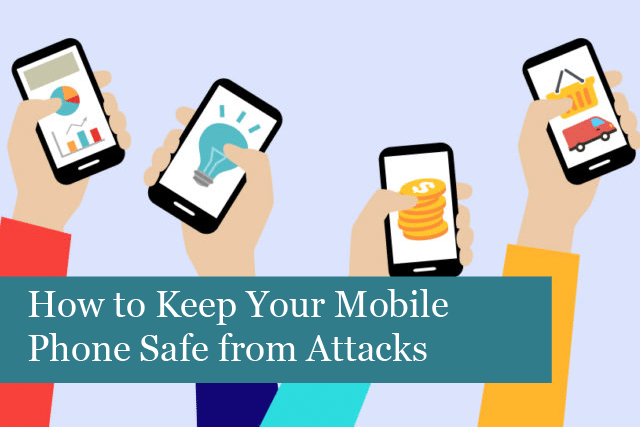
These days, hackers are busy attacking us through many means of communication. They try to trick people through email & SMS phishing, and more. Increasingly, cyber criminals are finding ways to hack our mobile phones, too.
Think of all the personal data stored on your mobile phone. Do you use shopping, banking, and other apps? If so, hackers could find a way to access your phone and steal valuable personal data. With this data, they could gain access to banking details and much more. So, it’s important to keep your phone safe from cyberattacks.
We’ve put together a list of methods to help you keep your phone more secure:
1). WiFi
Never allow your phone to auto-join unfamiliar networks. While it’s handy to allow your mobile phone to connect to all WiFi networks, the danger is connecting to public networks can be a security threat. They often aren’t protected and secure, making it easy for hackers to gain access to your phone.
So, only allow your phone to auto-connect to familiar networks, such as your home, work or other networks that you trust.
If you’re not using the WiFi function on your phone, then be sure to turn it off. Keeping it turned off will deny access to hackers who try to access your device via WiFi.
Unless you’re connected to a known, secure WiFi network, never send sensitive information. For instance, don’t check your bank account, send emails, or even shop on a public WiFi network. Otherwise, you could be leaving your phone open to access by cyber criminals.
2). Apps
Apps are another way hackers gain access to sensitive data on your smartphone. So, avoid downloading apps from third-party websites, and only get them from the app store for your specific device (such as the Play Store for Android, and App Store for iOS devices).
Apps in the app stores are usually held to a higher degree of security before they can be included in the store. On the other hand, apps from third-part sites may not be held to the same level of security.
In addition, never use apps that are from unknown developers or that have only bad reviews, or that have only been downloaded a few times. These are signs an app could be malicious.
Another important step to take with apps is to ensure they’re kept up to date. If you receive notifications on your phone that one or more apps need to be updated, then do this as soon as possible. The reason is that updated apps may contain security fixes for known or new vulnerabilities that can be exploited by hackers.
When it comes to permissions, it’s best not to grant apps excessive permissions, unless you trust the app. Granting an app too many permissions can make your phone easy for hackers to access. For instance, if you download a flashlight app, does the app really need to access photos, monitor phone calls, and more? The short answer is no. Always review the permissions before downloading the app, and stay away from apps that request permissions that are not in line with their purpose.
Lastly, if an app is no longer supported by the app store, then it’s best to delete it. Unsupported apps are those that no longer receive updates. This means the app could pose a security risk, so it’s best to just delete it from your device.
3). Browsers
We all use browsers on our mobile phones, and often fail to remember these can also pose a security risk. Just like on other devices, always pay attention to ads and contests that seem to good to be true. The reason is that they could lead you directly to a phishing site. These sites often look real, but are only out to get your personal data.
Be watchful of URLs, too. While these are harder to read and verify on a mobile device, being careful of links can save you from cybercriminals. Use the same precautions as you do on desktop and laptops and never follow a link that looks suspicious.
Some browsers ask if you’d like to save sign in details, much like a password manager tool. This is not a good idea. If the browser is taken over by a criminal attack, hackers would have easy access to your usernames and passwords. If you’d like to save your details, then use a password manager instead. These are much more secure and even stay synced across devices.
4). Bluetooth
Many people don’t realise it, but criminals can also access phones via Bluetooth. For this reason, it’s best to run off Bluetooth services when they’re not in use.
Also turn off auto-pairing in Bluetooth settings, making sure to only connect to devices you know and trust.
Smishing Attacks (Phishing Attacks via SMS)
SMS is another way criminals use to gain personal information from you and your phone. Always be suspect of any SMS message that asks you to share personal information. These attacks are very similar to email phishing attacks, so avoid clicking links in an SMS that seems suspicious.
Phishing doesn’t just come through email or SMS. Criminals are also using other messaging apps to attack. These can include WhatsApp, Facebook Messenger, Instagram and more. Always stay alert, and avoid opening a message that seems suspicious, or clicking links in messages that seem somehow suspect.
Vishing (Voice Phishing)
Vishing is another method hackers use to gain personal data. In these types of attacks, you may receive phone calls from what appears to be a reputable organisation. They will ask you for money and may try to get you to share bank information to gain access to your account.
Another method hackers use is to get you to leave a voice message that includes personal details. They may ask for your account information such as bank account number, your name, address, and more. Banks will never call and ask for your account details, not even for security questions.
As you can see, hackers are highly creative and continually work on new methods to gain your personal information. Always stay alert and question any message or phone call that appears suspect. If you believe a message could be real, avoid clicking links or opening attachments. Instead, go to the organisations website online and call them directly. They’ll be able to offer guidance on what you need to do next.
Recommended Posts

How to Get the Most Out of Your IT Budget
25th April 2025

10 Biggest Cybersecurity Mistakes of Small Companies
18th April 2025

The Importance of Planning in Business IT Solutions
11th April 2025
